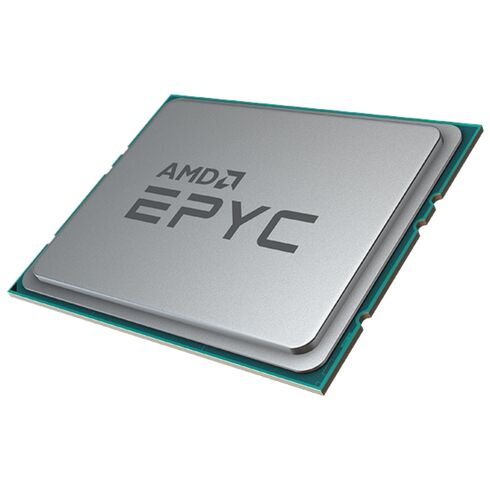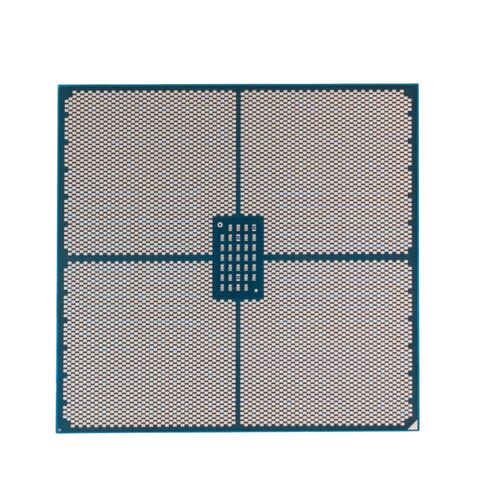100-000000504WOF AMD EPYC 64-Core 2.2-3.5GHz CPU, 768MB L3 Cache, 280W Power
- — Free Ground Shipping
- — Min. 6-month Replacement Warranty
- — Genuine/Authentic Products
- — Easy Return and Exchange
- — Different Payment Methods
- — Best Price
- — We Guarantee Price Matching
- — Tax-Exempt Facilities
- — 24/7 Live Chat, Phone Support
- — Visa, MasterCard, Discover, and Amex
- — JCB, Diners Club, UnionPay
- — PayPal, ACH/Bank Transfer (11% Off)
- — Apple Pay, Amazon Pay, Google Pay
- — Buy Now, Pay Later - Affirm, Afterpay
- — GOV/EDU/Institutions PO's Accepted
- — Invoices
- — Deliver Anywhere
- — Express Delivery in the USA and Worldwide
- — Ship to -APO -FPO
- — For USA - Free Ground Shipping
- — Worldwide - from $30
Product Specifications
Key Details
- Processor Type: Server Processor
- Manufacturer: Advanced Micro Devices Inc.
- Model: Epyc 7773x
- Manufacturer Part Number: 100-000000504WOF
Core Performance
The AMD Epyc 7773x is engineered for high-demand server environments, offering exceptional processing power.
- Total Cores: 64 cores for parallel processing
- Base Clock Speed: 2.2 GHz for reliable performance
- Maximum Boost Clock: Up to 3.5 GHz for peak performance during intensive tasks
Cache Memory
Optimized for rapid data retrieval, the Epyc 7773x includes:
- L3 Cache: 768 MB for enhanced data handling and reduced latency
Thermal and Power Requirements
The processor is designed with efficiency in mind while managing heat and power consumption:
- Max Thermal Design Power (TDP): 280W for optimal energy management
Compatibility
- Socket Type: SP3 socket, ensuring broad compatibility with various server configurations
Performance and Efficiency
High-Performance Computing
- With its substantial core count and high clock speeds, the Epyc 7773x excels in handling complex computing workloads.
- Excellent for virtualization, cloud computing, and enterprise-grade applications.
- Scalable performance, able to handle demanding server tasks with ease.
Energy Management
- Despite its powerful specifications, the Epyc 7773x manages its energy usage efficiently, making it suitable for a wide range of server applications.
- Efficient thermal management at 280W TDP ensures stable operation during high-intensity workloads.
Ideal for Data Centers
- Designed for high-throughput applications, this processor is particularly well-suited for data centers that require robust, scalable server solutions.
Clock Speed
Introduction
The AMD EPYC 64-Core CPU is equipped with an impressive clock speed that ranges from 2.2GHz to 3.5GHz. This feature plays a crucial role in determining the overall performance and speed of the processor. In this section, we will explore the benefits and importance of the clock speed in detail.
Enhanced Performance
A higher clock speed allows the AMD EPYC 64-Core CPU to perform calculations and execute instructions at a faster rate. With a base clock speed of 2.2GHz, this processor can handle demanding tasks efficiently. Moreover, it has a turbo boost clock speed of up to 3.5GHz, which further enhances its performance for intensive workloads.
Whether you are running resource-intensive applications, performing complex simulations, or engaging in heavy multitasking, the high clock speed ensures that your tasks are completed swiftly, resulting in improved productivity and reduced waiting times.
Seamless Multithreading
The AMD EPYC 64-Core CPU supports simultaneous multithreading (SMT) technology, which allows each core to handle multiple threads simultaneously. This technology, coupled with the high clock speed, ensures smooth multitasking and better utilization of available resources.
With SMT, the processor can efficiently manage multiple tasks without sacrificing performance. This is particularly beneficial for users who often engage in activities that require running multiple applications or virtual machines concurrently.
Gaming Performance
In addition to its capabilities in professional work environments, the AMD EPYC 64-Core CPU's clock speed also contributes to an exceptional gaming experience. Many modern games rely heavily on single-threaded performance, making the high clock speed of this processor advantageous.
With the ability to reach a turbo boost clock speed of 3.5GHz, gamers can enjoy smooth gameplay, reduced lag, and faster loading times. The processor's responsiveness ensures that you can fully immerse yourself in the gaming world without any performance bottlenecks.
Overclocking Potential
For enthusiasts and power users who seek even higher performance levels, the AMD EPYC 64-Core CPU offers great overclocking potential. Overclocking allows you to increase the clock speed beyond the default settings, thereby squeezing out additional performance from the processor.
With proper cooling and configuration, users can push the clock speed closer to its limits and achieve even better results in terms of speed and responsiveness. However, it's important to note that overclocking may require additional hardware and careful monitoring to ensure system stability and longevity.
Content Creation
Content creators often work with applications that demand significant processing power. Whether it's video editing, 3D rendering, or compiling large codebases, the AMD EPYC 64-Core CPU's clock speed comes into play.
The high clock speed enables faster rendering times, quicker previews, and smoother real-time editing. This means content creators can complete their projects more efficiently, meet deadlines, and focus on delivering high-quality work.
Conclusion
The clock speed of the AMD EPYC 64-Core CPU is a vital feature that contributes to its exceptional performance across various tasks and applications. Whether you're a professional seeking faster processing in demanding workloads or a gamer looking for an immersive experience, this processor's high clock speed ensures a seamless and responsive computing experience.
Cache Size
Introduction
Another crucial feature of the AMD EPYC 64-Core CPU is its generous cache size, boasting an impressive 768MB L3 cache. In this section, we will explore the benefits and importance of this large cache size in detail.
Improved Data Access
The cache serves as a high-speed memory that stores frequently accessed data and instructions. With a larger cache size, the processor can store more data closer to the cores, resulting in faster access times and reduced latency.
The AMD EPYC 64-Core CPU's substantial 768MB L3 cache ensures that critical data required for processing is readily available, minimizing the time spent waiting for data retrieval. This translates to improved overall system performance and responsiveness.
Efficient Workload Management
A larger cache size allows the processor to hold a greater amount of data, improving its ability to predict and prefetch data that will be required in the near future. This predictive capability enables more efficient workload management and smoother execution of tasks.
Whether you're running applications with large datasets, working on complex simulations, or engaging in data-intensive tasks, the AMD EPYC 64-Core CPU's ample cache size ensures that your processor can handle the workload efficiently and effectively.
Virtualization Performance
Virtualization has become an essential aspect of modern computing environments. The AMD EPYC 64-Core CPU's substantial cache size plays a significant role in enhancing virtualization performance.
When running multiple virtual machines simultaneously, each virtual machine requires its own set of resources. The large cache size allows for better resource allocation and reduces contention among virtual machines. This results in improved virtual machine performance and responsiveness.
Faster Application Launch Times
In addition to its impact on overall system performance, the AMD EPYC 64-Core CPU's large cache size also benefits individual applications. With more data stored in the cache, frequently used instructions and data can be accessed quickly, resulting in faster application launch times.
Whether you're opening resource-intensive applications like photo or video editing software or launching multiple applications simultaneously, the large cache size ensures a smooth and snappy experience.
Database Performance
For users working with databases, the AMD EPYC 64-Core CPU's generous cache size offers significant advantages. Databases rely heavily on data retrieval and processing, often involving complex queries and joins.
The large cache size allows for efficient caching of frequently accessed data, reducing the need for frequent disk reads. This results in improved database performance, reduced query execution times, and enhanced overall responsiveness when working with large datasets.
Power Consumption
Introduction
The power consumption of a processor is an important consideration for many users. The AMD EPYC 64-Core CPU boasts a power consumption of 280W. In this section, we will explore the benefits and importance of power consumption in detail.
Energy Efficiency
Efficient power consumption is not only beneficial for the environment but also for users who are conscious of their energy usage and electricity bills. The AMD EPYC 64-Core CPU's power consumption of 280W strikes a balance between performance and energy efficiency.
By optimizing power consumption, this processor ensures that it delivers exceptional performance while minimizing unnecessary energy usage. This is particularly important for users who run their systems for extended periods or require multiple processors in server environments.
Cooling Requirements
High-performance processors generate heat, and effective cooling is necessary to maintain optimal operating temperatures. The AMD EPYC 64-Core CPU's power consumption of 280W requires a robust cooling solution to ensure efficient heat dissipation.
By choosing an appropriate cooling solution, users can effectively manage the processor's thermal output, ensuring stable and reliable operation. This is especially relevant for users in warmer climates or those who engage in demanding workloads for extended periods.
Server Deployments
The AMD EPYC 64-Core CPU's power consumption is an important consideration for server deployments. Data centers and cloud service providers need to balance performance with power usage to optimize their operations and reduce costs.
With a power consumption of 280W, this processor offers an excellent performance-to-power ratio, making it a suitable choice for server deployments. The ability to maximize processing power while minimizing energy consumption contributes to overall operational efficiency and cost savings.
Sustainability
In today's world, sustainability is a growing concern. By choosing a processor with optimized power consumption, such as the AMD EPYC 64-Core CPU, users can contribute to reducing their carbon footprint and promoting environmentally friendly practices.
Whether you're an individual user or part of an organization committed to sustainability, selecting energy-efficient components helps minimize the environmental impact of computing operations.
Reliability and Longevity
Efficient power consumption not only benefits the environment but also contributes to the reliability and longevity of the processor. By operating within its recommended power consumption range, the AMD EPYC 64-Core CPU ensures stable performance and reduces the risk of premature failures or errors.
Proper power management helps prevent excessive heat buildup, which can degrade components over time. The processor's efficient power consumption contributes to its overall reliability, allowing users to confidently rely on it for their computing needs.











